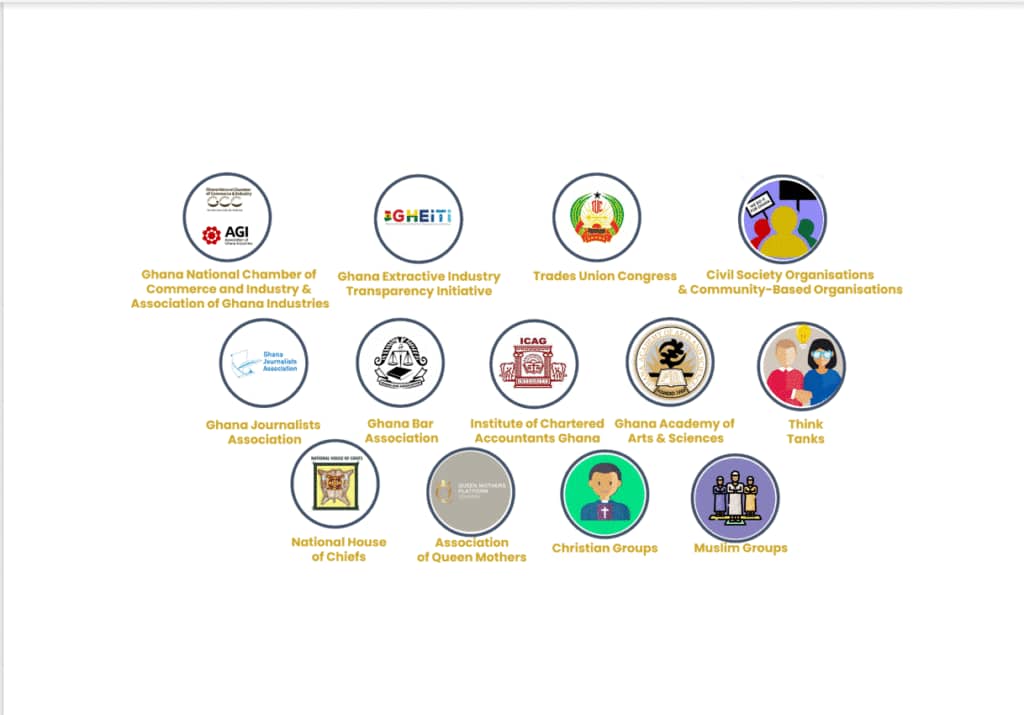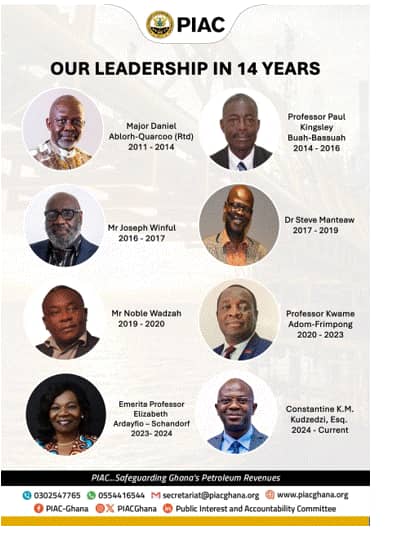File photo
In September 2011, the Public Interest and Accountability Committee (PIAC) was established as an additional oversight body through the Petroleum Revenue Management Act (PRMA), 2011 (Act 815), as part of efforts to ensure transparency and accountability in the management and use of petroleum revenues.
With a clearly defined mandate, PIAC has, in the last 14 years, worked to fulfil this mandate of ensuring efficient management of petroleum revenues for sustainable development as stipulated in the PRMA.
As the Committee marks 14 years of existence, it is worth reflecting on its journey, achievements, challenges, and the way forward to ensure that petroleum revenues serve as a true catalyst for Ghana’s development.
- Establishment of PIAC
The Petroleum Revenue Management Act (PRMA), 2011 (Act 815) established PIAC with a three-fold mandate to:
- monitor and evaluate compliance with the Act by government and relevant institutions in the management and use of petroleum revenues and investments;
- provide space and platform for the public to debate on whether spending prospects and management and use of revenues conform to development priorities as provided under section 21(3); and,
- provide independent assessment on the management and use of petroleum revenues to assist Parliament and the Executive in the oversight and the performance of related functions respectively.
Drawn from 13 member-institutions provided for by the Act, members of PIAC serve either a two-year (renewable) or three- year (non-renewable) tenure as shown in the attached image.
The unique nature of the membership of PIAC is designed to bring together diverse stakeholders from across the Ghanaian society to ensure balanced representation and expertise in the oversight of petroleum revenue management.
- 14-Year journey
Since PIAC’s establishment, its programmes and activities have been broadly aligned with the three-fold mandate. From monitoring and evaluating compliance with provisions of the Act and reporting on same, to providing a space and platform for citizens engagement, and conducting independent assessment of the management and use of petroleum revenues, PIAC has key milestones to share.
Section 56 of the PRMA mandates the Committee to publish two statutory reports each year, an annual and a semi-annual report. The Committee has accordingly published 27 Reports (13 Annual and 14 semi-annual), copies of which are submitted to the Presidency, Parliament and citizens, thereby improving transparency in petroleum revenue reporting. Over the years, PIAC’s reports have delivered comprehensive analyses of petroleum revenue management and utilisation, thereby reinforcing transparency, and empowering citizens to demand accountability. The reports are also acknowledged as an authoritative source of data for research and advocacy.
In line with its mandate to independently monitor and evaluate the management and use of petroleum revenues, the Committee inspects selected projects funded with petroleum revenues across the country. These projects are submitted to PIAC by the Ministry of Finance, providing details of petroleum revenue disbursements through the Annual Budget Funding Amount (ABFA). Findings from these inspections are made public through the media and captured in PIAC reports for the attention of Parliament and the Presidency.
Over the last 14 years, the Committee has organised townhall meetings at both Regional and Districts levels across the country to engage citizens on the management and use of petroleum revenues in Ghana. The Committee has also collaborated with the media, who are key partners, to reach a wider audience across the country. The use of the digital space for public education has been intensified. Through monthly sessions on Facebook and X (formerly Twitter), PIAC engages and educates the public on critical issues related to the management and use of petroleum revenues in Ghana. Such engagements are also used to elicit feedback from citizens on whether the use of petroleum revenues aligns with their developmental preferences. All this is in a bid to enhance public education and understanding of petroleum revenue management.
Another key milestone for the Committee is the development of an interactive data dashboard that houses statistics on petroleum revenue management. For data on production, liftings, allocations, distribution and utilisation, the dashboard comes in handy. The dashboard is housed on PIAC’s website, www.piacghana.org.
As part of its independent assessment mandate, the Committee has published two issue papers, on “Ghana’s management and use of petroleum revenues”, and “The Role of The Ghana National Petroleum Corporation (GNPC) in the Upstream Petroleum Industry: Challenges and Prospects”. Both Papers highlighted key issues that required attention and action by duty bearers. These Papers are available on the Committee’s website. www.piacghana.org for download.
Impact Stories
The impact of PIAC’s work over the years has been evident. Firstly, the amendments of the PRMA in 2015 and 2025 were significantly informed by findings and recommendations of PIAC reports. Secondly, the passage of the PRMA Regulations (L.I. 2381) in 2019 by Parliament came about through the recommendation of PIAC.
Thanks to PIAC work, payment of revenues due the State into wrong accounts by some International Oil Companies, which used to be recurrent, has ceased. Collaboration between PIAC and the GRA has led to the bridging of tax audit gap and the payment of additional tax to the State.
Through PIAC’s compliance monitoring, some PRMA breaches have been corrected and the incidences reduced. For instance, in 2017, the breach by the government of the 70:30 public investment expenditure to goods and services statutory ratio was remedied through PIAC work. At the barest minimum, the breaches are raised by PIAC in its reports for the respective institutions to take corrective action.
In acknowledgement of PIAC work, citizens and CSOs have proposed that the powers of PIAC should be increased to extend the frontiers of accountability under its current mandate. Furthermore, citizens and CSOs have also suggested that mineral revenues should be added to PIAC mandate so that the transparency and accountability being witnessed in petroleum revenue management will be expanded to mineral revenues.
Perhaps, the nation could consider replicating the PIAC model of institutional representation and tenure on boards and committees to ensure continuity and expertise.
Challenges
The challenges of the Committee started right from its establishment. Although established by law, there was no funding provision for PIAC in the Act. It had to rely largely on donor support to be able to carry out its mandate. From 2011, resources were provided by the Ministry of Finance complemented by GIZ to fund PIAC limited programmes, including the compilation and publication of the statutory reports. PIAC also received support from Oxfam USA, and the Natural Resource Governance Institute (NRGI) (formerly, Revenue Watch Institute) which made office space available for the PIAC Secretariat. Additionally, NRGI secured funding from the Department for International Development (DfID) and later the Ghana Oil and Gas for Inclusive Growth (GOGIG) Programme both of the UK Government which led to the strengthening of the secretariat and the addition of district level engagements and project inspections.
Following sustained advocacy by PIAC, civil society and the media, the PRMA was amended in 2015 to make provision for the funding of PIAC from the Annual Budget Funding Amount (ABFA). From 2016 to 2024, PIAC had relatively stable funding and this had a positive impact on its programmes and activities.
In April 2025, the PRMA was amended to confine the use of the ABFA to infrastructure development thereby, removing PIAC’s funding from the ABFA. The Committee’s operations have since been adversely impacted, and that has practically derailed its operations.
Looking Ahead
The Committee reflects on its 14-year existence with renewed strength as it continues to engage government on its funding, following the latest amendment of the PRMA. The journey has not been without challenges, but its contribution to national development discourse is undeniable. For 14 years, PIAC has stood as a watchdog over Ghana’s petroleum revenues, promoting transparency, accountability, and citizen participation in resource governance.
As Ghana continues to exploit its petroleum resources, PIAC’s role remains crucial. PIAC will continue to improve its citizen engagement, push for better accountability, thereby strengthening governance systems, and ensuring petroleum revenues benefit all citizens.
Cheers to 14 years of impact and to many more years of safeguarding Ghana’s oil wealth for current and future generations.
PIAC … Safeguarding Ghana’s Petroleum Revenues.


By Isaac Dwamena, Esq. & Jessica Acheampong
The writers are the Executive Secretary, and Senior Communication Manager, PIAC.


